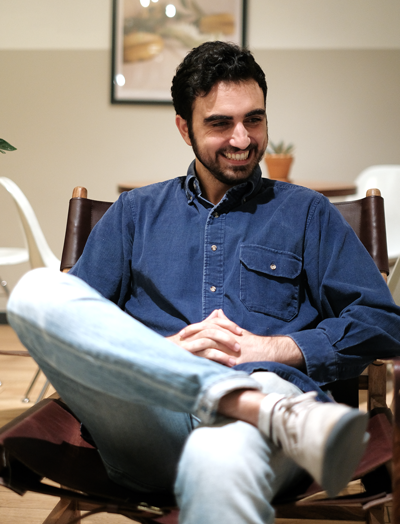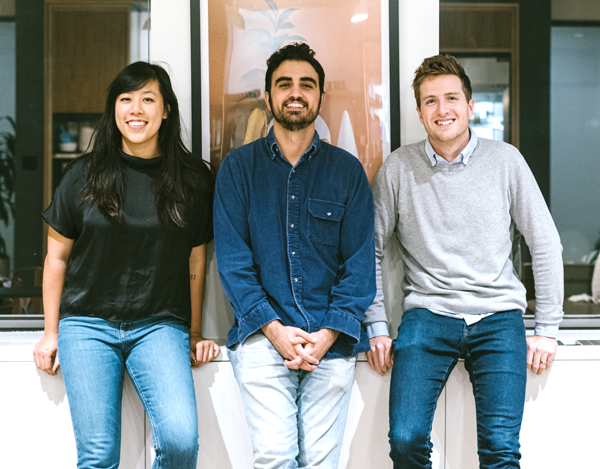Q & A with Alumnus Faraz Milani ’14

May 20, 2020 - After graduating with a bachelor’s degree in electrical engineering and computer science from the Samueli School of Engineering, Milani headed home to the Silicon Valley, where he worked for several startup companies. In 2019, he started his own business, called Heard (joinheard.com), with two others. A digital platform for private practice therapists, it helps counselors build an online community for purposes of referral, connection and learning. He drew on his own experience in seeking help for insomnia and anxiety to develop Heard; his mission is to destigmatize mental health care and make it more accessible.
Tell us about your career path
My first job was as the lead quality assurance engineer with Estate Assist, a digital safe deposit box. After about a year, we were acquired by DocuSign, where I also served as lead QA engineer, then went on to become product manager for two products. Throughout high school and college, I had struggled with sleep issues, and while the fast-paced mania of working for a startup was exciting and fun, it amplified my sleepless nights and dissolved my duct-taped coping mechanisms. To the outside world, I was thriving, but the reality was I had insomnia and anxiety, which often turned into depression. After many doctors’ appointments and finding the right therapist, I was able to turn my life around.
What inspired you to start Heard?
My own experience of making my mental health a priority led me to start Heard in 2019. I’m a high-functioning person with many loved ones, and there are so many other people like me dealing with mental health conditions, so my main purpose became to help destigmatize mental health and make finding a therapist more accessible. I met my co-founders, we secured some initial angel investor funding and a couple months later, we quit our jobs to pursue this mission.

How is the business doing?
Our first version of Heard was a client-therapist matching platform, sort of like a dating app. We connected over 250 clients with therapists. But we quickly realized the unit economics were not on our side. Though therapists always need new clients, they have many other pressing needs that nobody was addressing. Owning a private practice is like running a small business. The providers we spoke to were inundated with clients, using outdated, inefficient technology and systems and not well versed in smart business practices.
Once the coronavirus pandemic hit, therapists were overwhelmed with helping people cope, while also trying to cope themselves. It became clear that helping match people to counselors wouldn’t do any good if the therapists were overworked, under-resourced and emotionally unsupported.
After listening to feedback from users and considering the challenges of the coronavirus pandemic, we adjusted our model and launched version 2 of the platform. Heard is now a trusted space for therapists, providing referral technology, community building and tools for success. We feel it enables therapy-seekers to be routed to the best possible care that matches their needs and preferences.
What have been the challenges?
Staying focused is the main thing, not trying to do too much, for example adding too many features, trying to please every therapist, that sort of thing. Also, adjusting to working remotely and with the various styles of my other co-founders. Our CEO Andrew Riesen is in Seattle, while Victoria Li (chief technology officer) and I (chief product officer) are located in the Bay Area. We are all super passionate and opinionated, so we’ve come up with frameworks for decision-making.
What’s next for your company?
We’re currently running a free closed beta with 100 providers in California, with more on the waiting list. San Francisco and Los Angeles are our two big hubs, and we’re focused on creating the best possible experience for our members. Starting in June, we will charge a monthly/annual membership fee for those who want to be a part of the Heard platform.
The mental health startup ecosystem is booming. There are very few companies that are thinking therapist-first − meaning treating therapists with respect and care, as opposed to a transaction or tool to make money. We believe this is essential to success in the mental health space. Our team has an extraordinary mix of product talent and empathy for therapists that will be very hard to stop.
What advice can you offer other entrepreneurs?
If you don’t like uncertainty, problems that haven’t been solved before or failure, startups probably aren’t for you. Ask yourself, is this something you are so passionate about that you can get up again and again every time you deal with failure or rejection? If you are financially able, just start − there is no good time to start a company, it’s always a massive risk and an emotional roller coaster.
And finally, if you aren’t financially able, join an early stage startup. There are companies that will take bets on young, motivated people. Even if it’s not the exact position you want, it’s still highly valuable because in a startup, everyone does everything. Look for a startup with experienced founders.
When did you know you wanted to be an engineer?
I went into UCI undecided on my major. I was obsessed with the startup tech scene, growing up in Silicon Valley, so I knew I wanted to understand more of how technology works. I’ve always been an analytical thinker, so when I started taking engineering-related classes, it just worked. I consider myself a generalist, as I’m very passionate about learning everything.
Any favorite memories of being an Anteater?
When we broke the world record for largest dodgeball game. So fun.
– Lori Brandt
